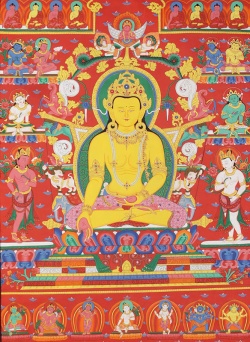Ratnasambhava
Ratnasambhava in other languages:
Chinese: 寳生如來, Baosheng Rulai
Japanese: 宝生如来, Hōshō Nyorai
Tibetan: Rinchen Jung ne Rin jung
Vietnamese: Bảo Sanh Như Lai
Ratnasambhava is one of the Five Dhyani Buddhas (or "Five Meditation Buddhas") of Vajrayana or Tantric Buddhism. Ratnasambhava's mandalas and mantras focus on developing Equanimity and equality and, in Vajrayana buddhist Thought is associated with the attempt to destroy Greed and pride. His consort is Mamaki and his mount is a Horse or a pair of lions. His wrathful manifestation is Gundari. Often included in his retinue is the worldly dharmapāla Jambhala.
The first documented mention of Ratnasambhava is found in the Ārya Suvarna-prabhā-sottamasutrendrarājamahāyana Sutra (Sutra of Golden Light) and in the Guhyasamāja tantra (4th Century CE), and he subsequently appears in a number of Vajrayana texts. The most elaborate account of him is to be found in the Panchakara section of the Advyavajra sangrah.
RatnasaṃBhava is associated with the Skandha of Feeling or sensation and its relationship with Consciousness. His activity in promoting Buddhism is enriching and increasing Knowledge of Dharma. Ratnasambhava is associated with the jewel Symbol, which corresponds with his family, Ratna or jewel. In artwork he is shown in the Mudra of giving.
He is usually coloured yellow or gold. He is associated with the element Earth, the heavenly quarter of the south and the season of autumn. His cardinal direction is the south. His Buddha field is known as Śrimat.
In the Bardo Thodol, he is depicted in union with Mamaki and attended by the male Bodhisattvas Akashagarbha and Samantabhadra and the female bodisattvas Mala and Dhupa.
In Tibet, Vaiśravaṇa, also known as Jambhala and Kubera, is considered a worldly dharmapāla, and is often depicted as a member of the retinue of Ratnasambhava. The Wisdom King Gundari is a manifestation of Ratnasambhava.
The Wisdom King Gundari is a manifestation of Ratnasambhava (Hōshō Nyorai)
